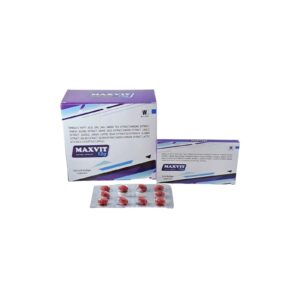MULTIVITAMINS + ANTIOXIDANT + MULTIMINERALS
Multivitamins: Multivitamins are a combination of essential vitamins and minerals that are taken orally as supplements. They are commonly used to prevent or treat deficiencies of various vitamins and minerals in the body.
The mechanism of action of multivitamins is based on the fact that vitamins and minerals are essential for the normal functioning of the body. They play vital roles in processes such as cell growth, metabolism, immune function, and energy production. When there is a deficiency of one or more vitamins or minerals, multivitamins can help to replenish and maintain optimal levels, promoting overall health and well-being.
The recommended dose of multivitamins varies depending on the brand and specific formulation. Generally, one tablet or capsule is taken daily with a meal. It is important to follow the instructions provided by the manufacturer or as directed by a healthcare professional to ensure the correct dosage.
Side effects of multivitamins are usually minimal and rare when taken as directed. However, some people may experience mild gastrointestinal symptoms such as nausea, vomiting, or stomach upset. In rare cases, allergic reactions may occur, characterized by rash, itching, or swelling.
It is important to note that multivitamins should not be used as a substitute for a healthy diet. They are meant to supplement a balanced diet and lifestyle, providing additional nutrients that may be lacking in the diet. If you have specific nutrient deficiencies or medical conditions, it is advisable to consult with a healthcare professional before starting any multivitamin regimen.
Antioxidant: Drug Name: Antioxidant
Use: Antioxidants are substances that protect cells from damage caused by unstable molecules called free radicals. Antioxidants can be taken as a supplement or found naturally in certain foods. They are used primarily for their potential health benefits, including boosting the immune system, preventing chronic diseases, reducing inflammation, and slowing down the aging process.
Mechanism of Action: Antioxidants neutralize free radicals by donating an electron, thus preventing them from causing damage to cells and DNA. Free radicals are produced as a byproduct of normal cellular metabolism or can be generated by external factors such as pollution, cigarette smoke, and UV radiation. By reducing the levels of free radicals, antioxidants help maintain cellular health and protect against oxidative stress.
Dose: The recommended dose of antioxidants can vary depending on the specific type being used and the individual’s needs. Generally, it is recommended to obtain antioxidants through a balanced diet rich in fruits, vegetables, whole grains, nuts, and seeds. However, if using antioxidant supplements, it is important to follow the recommended dosage provided by the manufacturer or as prescribed by a healthcare professional.
Side Effects: The use of antioxidants is generally considered safe when obtained from dietary sources. However, when used in high doses through supplements, some side effects can occur. These may include diarrhea, nausea, stomach cramps, headaches, allergic reactions, and interference with the absorption of certain medications. It is important to consult with a healthcare professional before starting any antioxidant supplements to ensure they are appropriate for individual needs and to avoid potential interactions with other medications or health conditions.
Multiminerals: Multiminerals is a medication that contains a combination of essential minerals commonly found in the human body. It is used as a dietary supplement to prevent or treat mineral deficiencies that may arise from various conditions, such as poor diet, malabsorption disorders, or certain medical treatments.
The mechanism of action of Multiminerals is quite straightforward. Each mineral included in the formulation has its own specific function in the body. For example, calcium and magnesium are essential for maintaining healthy bones and teeth, while iron is required for the production of red blood cells. By providing these minerals in adequate amounts, Multiminerals helps ensure that the body can perform its essential functions properly.
The dose of Multiminerals can vary depending on various factors such as age, sex, and the specific mineral deficiencies being addressed. It is important to follow the dosage instructions provided by the healthcare professional or as stated on the product label. Generally, Multiminerals are taken orally with water, and it is recommended to take them with food to enhance absorption and minimize potential stomach upset.
While Multiminerals are generally considered safe when used as directed, there may be some potential side effects. These can include gastrointestinal symptoms such as nausea, vomiting, constipation, or diarrhea. Allergic reactions can occur in rare cases and may present as itching, rash, or swelling. It is important to seek medical attention if any severe or persistent side effects occur.
It is worth noting that Multiminerals can interact with certain medications, such as antibiotics, bisphosphonates, or certain thyroid medications. Therefore, it is essential to inform your healthcare provider about all the medications you are taking before starting Multiminerals to avoid any potential drug interactions.
In summary, Multiminerals are a combination of essential minerals used to prevent or treat mineral deficiencies. By providing these minerals, Multiminerals help maintain proper body function. The dose and potential side effects may vary, so it is important to follow the instructions provided by the healthcare professional or on the product label.

